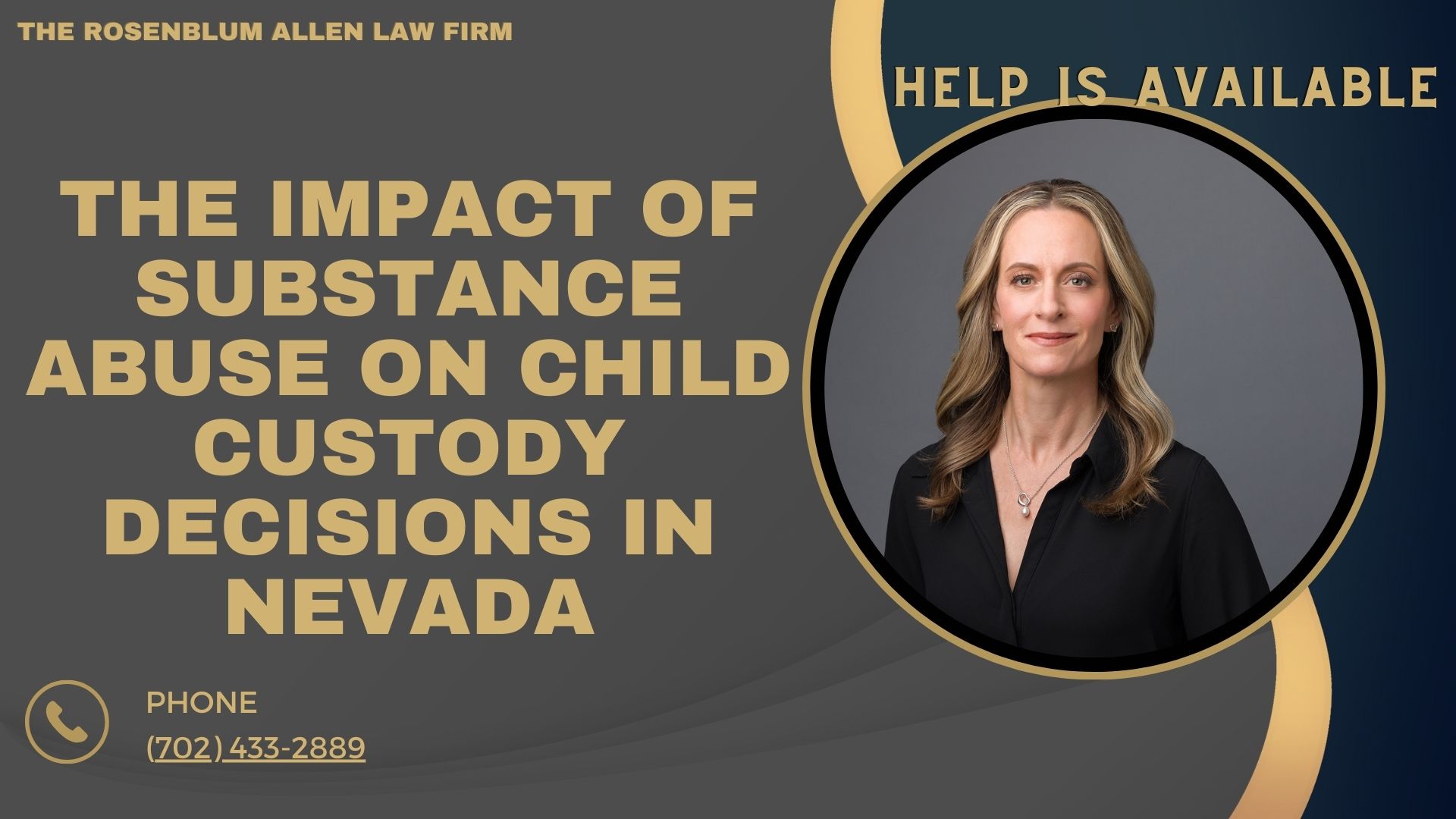Substance abuse can significantly impact child custody decisions in Nevada, where courts prioritize the safety and well-being of the child above all else. If one or both parents struggle with substance abuse, it can raise serious concerns about their ability to provide a stable and secure environment for their children. Understanding how Nevada family courts approach these cases can help parents navigate the challenging intersection of addiction and custody. This article will explore how substance abuse affects child custody, including the role of court-ordered drug testing, supervised visitation, and rehabilitation requirements.
Substance Abuse and Its Effect on Child
Custody
Substance abuse involves the harmful or hazardous use of substances, including alcohol, illegal drugs, and prescription medications, in a way that impairs a person’s ability to function normally. When it comes to child custody, substance abuse can undermine a parent’s capacity to provide safe and responsible care.
Common Concerns Related to Substance Abuse in Custody Cases
- Impaired Judgment: Substance abuse can cloud decision-making, leading to unsafe or neglectful parenting.
- Unpredictable Behavior: Parents under the influence may exhibit erratic behavior, which can create an unstable home environment.
- Neglect of Child’s Needs: Addiction often takes precedence over a child’s needs, leading to emotional and physical neglect.
- Increased Risk of Abuse: Substance abuse can elevate the risk of physical or emotional abuse due to altered behavior.
Substance abuse is not only about using drugs or alcohol; it’s about how that use affects parenting. Nevada family courts closely examine these impacts when determining custody arrangements.
How Nevada Family Courts Handle Substance Abuse in Custody Cases
Nevada family courts are guided by the “best interests of the child” standard. This principle ensures that every decision prioritizes the child’s safety, health, and emotional well-being. Substance abuse by a parent is a significant factor that courts evaluate when making custody decisions.
Factors Nevada Courts Consider in Substance Abuse Cases
- Frequency and Severity of Substance Use: Occasional use may be viewed differently than chronic, severe addiction.
- Evidence of Impaired Parenting: Testimonies, police reports, and other evidence showing the direct impact of substance abuse on the child.
- Steps Taken Towards Rehabilitation: Demonstrating commitment to sobriety through participation in rehabilitation programs or counseling.
- Safety Concerns for the Child: Any potential danger the child faces due to the parent’s substance abuse.
The court’s primary goal is to protect the child from harm while still considering the rights of both parents. However, if substance abuse poses a direct threat to the child, it can significantly influence the custody outcome.
Consequences of Failing a Drug Test
- Loss of Custody or Visitation Rights: Failing a drug test can lead to immediate restrictions on custody or visitation.
- Requirement for Supervised Visitation: Courts may impose supervised visitation to ensure the child’s safety.
- Mandatory Rehabilitation: The court may order participation in a rehabilitation program as a condition for regaining custody.
Drug testing helps Nevada courts make informed decisions that prioritize the child’s safety, ensuring that parents are sober and capable when caring for their children.

Supervised Visitation and Substance Abuse
Supervised visitation is a typical arrangement when a parent’s substance abuse raises safety concerns. In these cases, the court orders that a neutral third party monitor visits between the parent and child. This ensures the child is safe while maintaining a relationship with the parent.
What is Supervised Visitation?
Supervised visitation means that a parent can only see their child in the presence of a designated supervisor. The supervisor can be a professional, such as a social worker, or a trusted family member or friend approved by the court.
Purpose of Supervised Visitation
- Safety Assurance: Ensures that the child is safe during visits.
- Observing Parental Behavior: Allows the court to monitor the parent’s conduct and interactions with the child.
- Encouraging Sobriety: Provides an incentive for the parent to remain sober during visits.
- Facilitating Reconnection: Helps maintain a bond between the child and the parent in a controlled environment.
Scenarios Where Supervised Visitation May Be Ordered
- The parent has a recent history of substance abuse.
- The parent has failed court-ordered drug tests.
- Concerns about neglect, erratic behavior, or abuse due to substance use.
What to Expect During Supervised Visits
Supervised visits are structured and monitored to ensure the child’s well-being. Visits usually take place at designated visitation centers or other approved locations. The supervisor’s role is to observe the interaction, document any concerns, and intervene if necessary. This setting helps create a safe space where the child can interact with their parent without fear of harm.
Parents should use these visits to demonstrate their commitment to sobriety and positive parenting. Courts closely evaluate the success of supervised visits when considering future custody arrangements.

Rehabilitation Requirements in Custody Determinations
Rehabilitation can play a critical role in custody cases involving substance abuse. Nevada family courts often require parents struggling with addiction to complete rehabilitation programs as a condition for gaining or maintaining custody.
Role of Rehabilitation Programs
Rehabilitation isn’t just about overcoming addiction; it’s also about demonstrating to the court a commitment to change. Completing a rehab program can positively impact custody decisions by showing the court that the parent is taking concrete steps to address their substance abuse issues.
Compliance with Rehabilitation Requirements
- Progress Reports: Courts may require regular updates on the parent’s progress in rehab.
- Completion Certificates: Proof of completing required programs may be needed.
- Aftercare Participation: Like support groups, engaging in aftercare shows continued commitment to sobriety.
Rehabilitation is often a critical step for parents to regain custody rights, as it directly addresses the core issue of substance abuse. Courts appreciate efforts that demonstrate a parent’s willingness to change for the betterment of their child.

Breaking It All Down
Substance abuse can heavily influence child custody decisions in Nevada. The courts’ focus remains on the child’s safety, and parents struggling with addiction must take steps to prove their ability to provide a stable environment. From court-ordered drug testing to supervised visitation and mandatory rehabilitation, these measures are put in place to protect the child and guide parents toward healthier paths. By understanding and complying with these requirements, parents can work towards rebuilding their relationship with their child and securing a more favorable custody arrangement.

Frequently Asked Questions
How does substance abuse affect joint custody arrangements?
Substance abuse can impact joint custody by leading the court to adjust arrangements to ensure the child’s safety. This could mean altering joint custody to sole custody for the non-using parent, or imposing restrictions like supervised visitation for the parent struggling with substance abuse.
Can a parent regain custody after losing it due to substance abuse?
Yes, a parent can regain custody after losing it due to substance abuse by showing a consistent commitment to sobriety. This usually involves completing a rehabilitation program, staying clean, attending counseling, and demonstrating responsible behavior over time.
What kind of evidence can be used in court to prove substance abuse?
Evidence can include failed drug tests, testimonies from witnesses, police reports, medical records, and any documented behavior that shows impairment due to substance abuse. The court may also consider evidence of rehab participation or any prior arrests related to substance use.
Is medical marijuana use treated the same as illegal drug use in custody cases?
Nevada courts consider all substance use in terms of how it affects parenting ability. Even legal use, like medical marijuana, can be a concern if it impairs parenting or creates an unsafe environment for the child. The impact on custody depends on the case’s specifics and how it affects the child’s well-being.
Can one parent request drug testing for the other parent?
Yes, a parent can request that the court order the other parent to undergo drug testing if there are concerns about substance abuse. The requesting parent must provide reasonable grounds or evidence to justify the need for testing.
How long does supervised visitation typically last in substance abuse cases?
The duration of supervised visitation varies based on the parent’s progress in addressing their substance abuse issues. It could last a few months to several years, depending on compliance with court orders, rehabilitation success, and the parent’s ability to demonstrate responsible behavior.
What happens if a parent refuses court-ordered drug testing?
Refusing a court-ordered drug test can have severe consequences, including losing custody rights or visitation privileges. Courts may interpret refusal as an admission of substance abuse, leading to more stringent custody restrictions.
Can substance abuse treatment affect child support obligations?
Substance abuse treatment does not typically affect child support obligations. Regardless of treatment participation, a parent is still financially responsible for their child unless otherwise modified by the court due to exceptional circumstances.
What is the role of a guardian ad litem in custody cases involving substance abuse?
A guardian ad litem is a court-appointed advocate for the child’s best interests. In cases involving substance abuse, they investigate the family situation, speak with both parents, and make recommendations to the court regarding custody and visitation arrangements.
How can a parent prove they are sober in a custody case?
A parent can prove sobriety through consistent negative drug tests, documentation of completed rehab programs, attendance at support groups, and testimonies from counselors or other witnesses confirming their commitment to a sober lifestyle.
Can past substance abuse affect future custody decisions even after recovery?
Yes, past substance abuse can still be considered by the court in future custody decisions. However, evidence of sustained recovery and responsible behavior over time can mitigate past issues, especially if the parent demonstrates ongoing commitment to maintaining sobriety and providing a safe environment.
Can substance abuse allegations be used maliciously in custody battles?
Unfortunately, false allegations of substance abuse can occur in contentious custody battles. The court relies on evidence, such as drug tests and credible testimonies, to determine the truth. Making false claims can backfire, damaging the accuser’s credibility and impacting their custody rights.
Do Nevada courts favor one parent over the other in substance abuse cases?
Nevada courts do not favor one parent over another based on gender or status. The primary concern is always the best interests of the child. Custody decisions hinge on the ability of each parent to provide a safe, stable, and nurturing environment, regardless of which parent has a substance abuse issue.

Additional Resources for You from The Rosenblum Allen Law Firm.
If you’re navigating the complexities of divorce, remember that you don’t have to do it alone. Our lead attorney, Molly Rosenblum Allen, Esq., has developed a range of resources tailored to help you during this challenging time. These articles offer guidance, support, and answers to many of the pressing questions you may have about divorce in Nevada:
- Las Vegas Custody Attorney – Guidance on securing your parental rights in Las Vegas custody cases.
- Fathers Rights – Dedicated support for fathers seeking custody and visitation rights.
- Supervised Visitation – Information on supervised visitation arrangements and what to expect.
- Changing Custody Agreement – Steps and legal considerations for modifying an existing custody order.
- Grandparents Rights Nevada – Understanding the legal rights of grandparents in Nevada custody cases.
- Long Distance Co-Parenting – Strategies for effective co-parenting across long distances.
- How a Mother Can Lose a Custody Battle – Insights into common pitfalls that could affect a mother’s custody case.
- Custody Battle Tips for Nevadans – Practical advice for successfully navigating a custody battle in Nevada.
- What Not To Say In Child Custody Mediation – Tips on managing your communication during mediation to protect your custody rights.
- How Much is a Custody Lawyer – A breakdown of the costs associated with hiring a custody attorney in Nevada.
- Types of Custody in Las Vegas – An overview of the different custody arrangements available in Las Vegas.
- Nevada Child Custody Laws – Detailed information on the laws governing child custody in Nevada.
These resources are designed to provide valuable insights and empower you with the information you need during this difficult time. Molly Rosenblum Allen, Esq. and our team are dedicated to helping you make informed decisions every step of the way.

Offsite Resources for You
National Institute on Drug Abuse (NIDA): NIDA offers comprehensive information on substance abuse, treatment options, and research findings related to addiction.
Substance Abuse and Mental Health Services Administration (SAMHSA): SAMHSA provides resources, treatment locators, and guidance on mental health and substance use disorders, including a hotline for immediate support.
American Academy of Child and Adolescent Psychiatry (AACAP): AACAP offers insights into how substance abuse affects families and children, along with tips for parents navigating custody challenges.
Child Welfare Information Gateway: Child Welfare Information Gateway provides resources on how substance abuse impacts child welfare, legal guidance, and family support tools.
Partnership to End Addiction: Partnership to End Addiction provides resources for parents and families dealing with substance abuse, including support groups and guidance on talking to kids about addiction.
National Council on Alcoholism and Drug Dependence (NCADD): NCADD offers education, information, and referral resources related to alcoholism, drug addiction, and family impact.
Parents Helping Parents: Parents Helping Parents is a support and advocacy resource offering guidance specifically tailored for parents struggling with addiction-related custody issues.

A Special Message from Our Lead Attorney, Molly Rosenblum Allen, Esq

Thank you for taking the time to explore these resources. I hope you found the information helpful as you navigate this challenging time. If you have questions or need guidance specific to your situation, my team and I are here to help. Don’t hesitate to call us at (702) 433-2889. Let’s start finding the a sound path forward for you and your family.
Warm regards,
Molly Rosenblum Allen, Esq.






